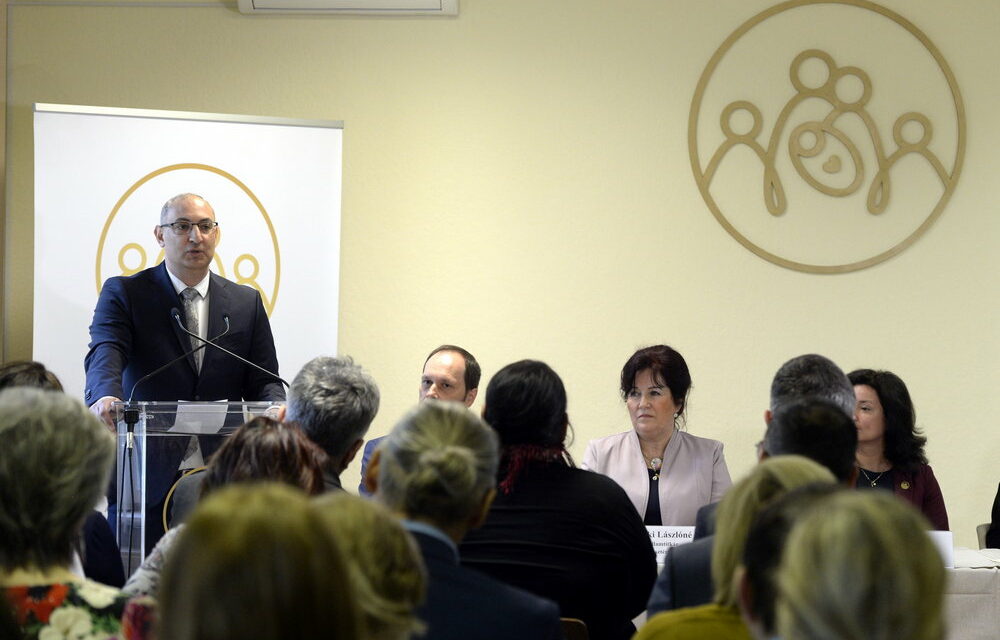There was a system change in the Roma case in 2010, when the government started to build a work-based society instead of the aid-based care of that time, said the government commissioner responsible for Roma relations on Friday at the professional conference of the Mária Kopp Institute for Population and Families (KINCS) in Budapest.
Attila Stójka spoke at the Roma Families Upward event about how the Roma were the biggest losers of the regime change in 1990, as most of them lost their jobs, and the government programs did not focus on creating jobs.
However, in 2010, the government brought a completely new approach by involving the Roma in an active, work-based society instead of passive, aid-based care, he pointed out.
According to Attila Sztojka, compared to Europe, the largest number of Roma work in Hungary: the employment level of Roma men is 81 percent, while the European average is 58 percent, and for women, this ratio is 44 and 28 percent, respectively.
He called the most important task of the next period for the government to continue to treat the Roma issue as a resource and to make the still underutilized Roma workforce a player in the economy.
In Hungary, the fight against poverty has started in the right direction, but the EU funds would be very important to continue, which the country does not have access to "for political reasons, not for professional reasons", said the government commissioner.
Zsófia Nagy-Vargha, the Deputy State Secretary responsible for youth at the Ministry of Culture and Innovation, spoke about the importance of talent management, which, she said, is a long-term and richly fruitful investment in the future.
The deputy state secretary singled out the National Talent Program among the government programs, thanks to which thousands of young people of Roma origin have received support in the past two years.
The Snétberger Music Talent Center operates in Felsőörs, Veszprém county, which embraces disadvantaged, talented young people, but not only provides high musical training, but also builds a community, he added.
He also spoke about the fact that some young Roma people have little chance to show their talent at all. He added: this is why Tanítsunk Hungary was launched in 2018! program, in the framework of which young university students deal with elementary school students living in small settlements in order to show them further education and employment opportunities.
Lászlóné Radomszki, the Ministry of the Interior's Deputy State Secretary responsible for social inclusion, said that the 2011 social inclusion strategy covers all areas of life, and one of its most important goals is to reduce the rate of financial and social deprivation among Roma families with children.
The deputy state secretary identified the involvement of parents and a complex approach as the key to social catch-up, and emphasized the importance of an interdependent institutional system. He mentioned the Safe Start children's houses, the tanoda system, the Roma vocational colleges, and the Traveling Scholarship program, in which more than nine thousand children participate, and which not only provides financial assistance, but also mentoring.
László Radomszki emphasized that the government supports Roma programs even in the current economic situation.
Tünde Fűrész, the president of KINCS, stated that the Hungarian Roma community is a valuable and important resource for Hungarian society, and that Roma families are the winners of the work-based family policy in the same way as other Hungarian families; the poverty indicators and housing conditions of Roma families have improved significantly.
He mentioned that they had investigated the percentage of people who use the social security allowance or the childcare allowance in the catch-up settlements, and they saw that the request does not differ from the national rate.
However, compared to the national average, different processes can be seen in childbearing behavior, he said. He added: at the same time, the difference between Romani and non-Roma women's childbearing behavior decreases as education levels increase.
At the event, the thematic issue of the KINCS Kapocs magazine dealing with Roma families was presented, in which research can be read, among other things, on the family planning habits of Roma girls, the school progress of young people, talent management and elderly care habits.
MTI
Photo: MTI/Attila Kovács












